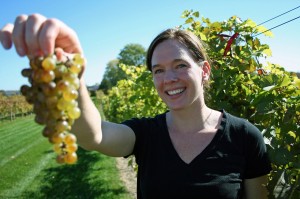Interview with Katie Cook, U of MN’s Rising Star
 Katie Cook left the Minneapolis suburb of Prior Lake after graduating from high school in 2000. What followed was a world-wide wine adventure that included a Masters of Enology degree from the University of Bourgogne in Dijon, France and stints as assistant winemaker at the award-winning Xabregas winery in remote Western Australia and at Quintessa in Rutherford, California.
Katie Cook left the Minneapolis suburb of Prior Lake after graduating from high school in 2000. What followed was a world-wide wine adventure that included a Masters of Enology degree from the University of Bourgogne in Dijon, France and stints as assistant winemaker at the award-winning Xabregas winery in remote Western Australia and at Quintessa in Rutherford, California.
In August 2010, Cook returned “home” as the Enology Project Leader in the renowned University of Minnesota Department of Horticultural Sciences. Midwest Wine Press spoke with Katie recently about her global perspective on the Midwest wine industry and her experience with cold climate winemaking.
MWP: How does the Midwest compare with other wine producing regions where you have worked or studied?
KC: A lot of progress has been made regionally in just the last several years. The viticultural traditions of established regions can be applied here so we don’t need as much time to establish our wine industry. We can borrow ideas and techniques that have worked in other places.
MWP: What are the some of the challenges with consumer perceptions of regional wine?
KC: If someone gets a bad bottle of California wine, they’ll say, ‘That’s just a bad bottle of wine.” But if someone drinks a flawed Minnesota wine, they’ll discount the entire industry. It’s not fair, but it’s how people sometimes think at this stage.
MWP: What can regional wineries do to improve wine quality?
KC: All winemakers should take time to really understand wine chemistry and sanitation. Also, we all succeed when we collaborate. In other wine regions, I’ve seen how winemakers work together. In the Midwest, most people understand the importance of working together, but occasionally you see some one-upmanship.
To continue reading this post, you must either subscribe or login.[login_form][show_to accesslevel=”annual-membership” ]
MWP: Let’s talk about Marquette, a University of Minnesota hybrid. There’s a lot of excitement about Marquette, but we have heard some growers complain of winter die off and issues with getting Marquette established.
KC: Yes, I’ve heard some comments, but we ourselves have not had problems with winter die off. Marquette can be more difficult to get established than a vine like Frontenac which has more native parentage. It takes three years minimum for Marquette to get established. Pruning the fruit during the summer for the first couple of years will help the vines develop. That’s because in the wild, a vine’s #1 priority is to spread out. Wild vines only produce fruit when they can’t spread anymore. When you prune vines, you’re telling them, “This is the limit.” Site selection is important too, Marquette should not be planted in low areas.
MWP: Marquette winemaking is a totally new science. Some winemakers are experimenting with oak and Marquette. Do you have any suggestions?
KC: Even though Marquette is a dark wine like Cabernet, it’s soft and delicate in flavor. It’s easy to cover up its fruit with too much oak. We’ve seen local winemakers doing some nice things with Radoux barrels in more of a Burgundian technique.
MWP: What about extended maceration and Marquette?
KC: Extended maceration with Marquette is tricky. You can wind up extracting tannins from the seeds because the alcohol content of Marquette is sometimes high enough to break down the coating on the seeds. Extended maceration of Marquette works best when the fruit is perfectly ripe.
MWP: Speaking of high alcohol content, are there steps, like amelioration, that can address the issue with Marquette?
KC: If you ameliorate, it’s best to do it as early as possible – within 24 hours of crush. After calculating how much water you need to add, bleed off the equivalent amount of juice from your tank before adding the water. The goal is to maintain a juice to skin ratio of 70-75%. Also remember that even though your goal is to dilute the sugar concentration, you are also diluting the acid concentration. You may need to readjust your total acidity. Then just ferment like a regular red wine. If you try to keep your skin to juice ratio correct, you are less likely to dilute any of the flavors and tannins that you will be extracting from the skins over the course of fermentation.
MWP: Do you have any suggestions for Marquette blending?
KC: You can blend Marquette with lower acid and sugar varietals like St. Croix. The challenge is that St. Croix – or any Vitis Labrusca – can dominate Marquette aromatically. So you might consider blending Marquette with a vinifera, like Pinot or Grenache. A lower sugar regional varietal, like Foch, might work well too as a blender.
MWP: In your September blog post, you said that you were making a sparkling rose from Marquette. How did it turn out?
KC: The sparkling Rose had some nice flavors but we bottled it too early and some of the bottles exploded! A Marquette Port worked well too. Marquette is a versatile grape, but most people will use it to make a dry wine.
MWP: In a short time, you’ve traveled and worked in more places than most folks do in a lifetime. When you returned to Minnesota in 2o10, did you notice anything about the food or wine culture that you may have taken for granted before ?
KC: Growing up in the Minneapolis suburbs I thought all places were pretty much the same; the world was just a big Minnesota. When I got to travel around the world, it impressed me how each area has its own unique culture. Then, when I came back to Minnesota last year, I was driving across the countryside during harvest and it just kind of hit me. For the first time, I had this special appreciation for things we have in our area; like all the pumpkins and squash and the hot apple cider. There really is a strong regional culture in Minnesota and the Midwest.
MWP: You teach beginning winemaking classes in Minnesota. For someone with your experience and credentials, that’s unusual.
KC: Teaching is new for me and I enjoy it. Several people who are taking my class are interested in starting a winery. I tell them it’s good to take your time and learn as much as you can before diving into commercial production.
To learn more about making wine with cold climate grapes and other fun things, please visit Katie’s blog at http://enology.umn.edu/
[/show_to][password-recovery-link text=’Lost Password? Click here for password recovery.’]
[wp_geo_map]



Ms. Cook,
Congratulations on your burgeoning success. This is less of a comment than a solicitation for your professional advice. We live in Wisconsin, zone 4. I am considering planting Marquette grapes for wine, but understand the wine usually requires amelioration with a different varietal. What other varietal should I plant…one that renders higher acidity?
Thank you so much for your time. I haven’t been able to find a suitable answer to date.